Spring 2025 Democratizing Work Colloquium
The “Democratizing Work” series, hosted by the Workers’ Rights Institute, is part of Professor Jamillah Bowman Williams’ colloquium for Spring 2025.
This colloquium explores the “future of work” in the context of mounting social challenges such as rising inequality, political turmoil, the climate crisis, and rapidly evolving AI technologies. Within this context, a historical debate on democratizing work is gaining steam globally. The focus is on collective strength, rather than individualism, a culture of care, rather than profit maximization, and sustainability. This movement argues that shifting power to workers is key to solving longstanding issues like poverty, while also getting closer to ideals of democracy.
Workers engage in a myriad of activities to shift power and accomplish these goals, including traditional labor reform, independent unions, and worker-owned cooperatives. While exploring these approaches, we will critically examine the relationship between political and economic democracy within the workplace and beyond.
Guests & Discussions
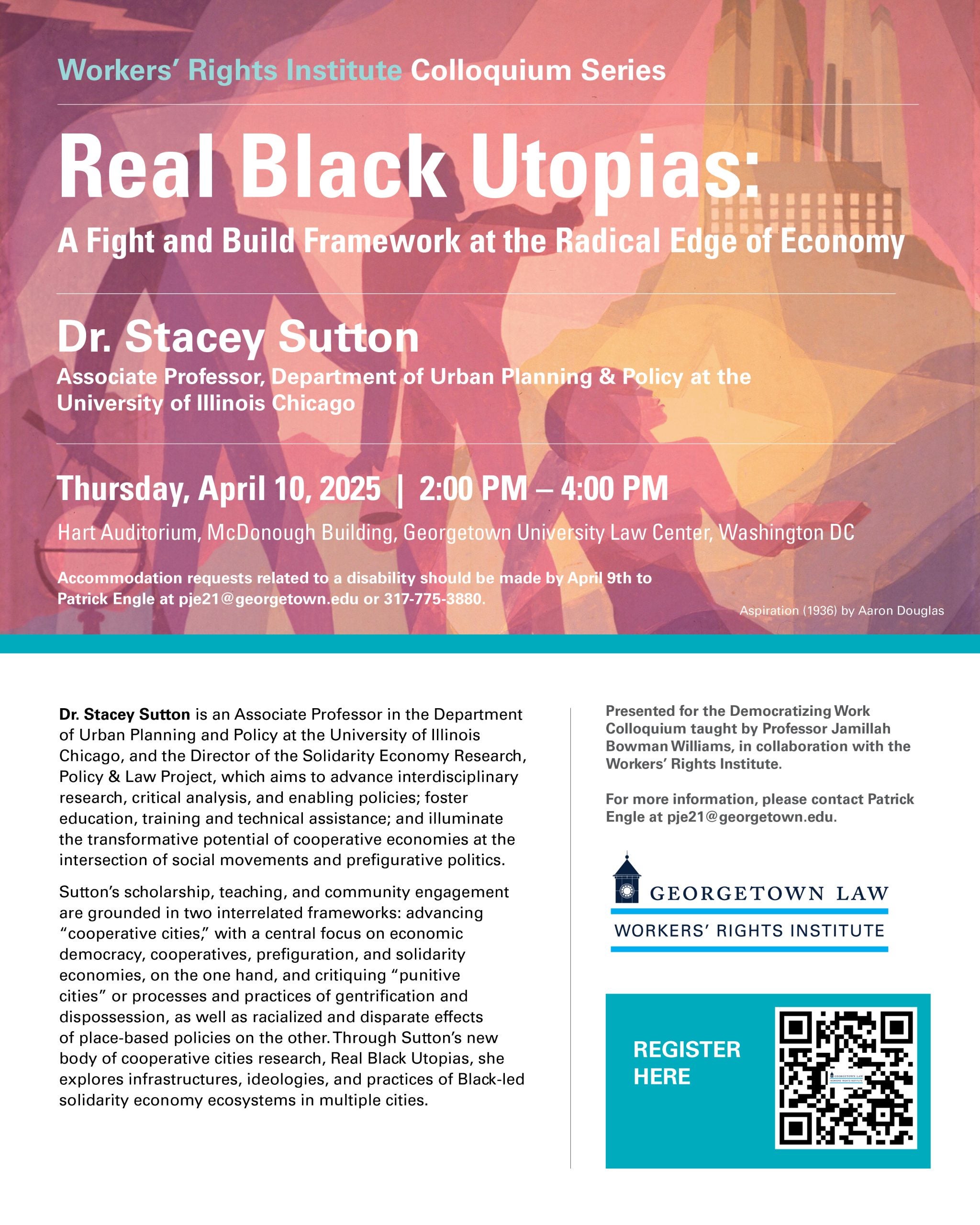
Topic: Real Black Utopias: A Fight and Build Framework at the Radical Edge of Economy
Date: April 10, 2025
Guest: Dr. Stacey Sutton | Associate Professor, Department of Urban Planning & Policy at the University of Illinois Chicago
Dr. Stacey Sutton is an Associate Professor in the Department of Urban Planning and Policy at the University of Illinois Chicago, and the Director of the Solidarity Economy Research, Policy & Law Project, which aims to advance interdisciplinary research, critical analysis, and enabling policies; foster education, training and technical assistance; and illuminate the transformative potential of cooperative economies at the intersection of social movements and prefigurative politics.
Sutton’s scholarship, teaching, and community engagement are grounded in two interrelated frameworks: advancing “cooperative cities,” with a central focus on economic democracy, cooperatives, prefiguration, and solidarity economies, on the one hand, and critiquing “punitive cities” or processes and practices of gentrification and dispossession, as well as racialized and disparate effects of place-based policies on the other. Through Sutton’s new body of cooperative cities research, Real Black Utopias, she explores infrastructures, ideologies, and practices of Black-led solidarity economy ecosystems in multiple cities.
Associated readings: Cooperative cities: Municipal support for worker cooperatives in the United States by Stacey Sutton; Jackson Rising Redux: Lessons on Building the Future in the Present by Kali Akuno & Matt Meyer; Stacey Sutton Discussing Real Black Utopias [Audio]; From the Solidarity Economies: Building Community Power Series: Seeding Solidarity Economies: What’s Behind the Emerging Ecosystems by Stacey Sutton (Introduction to Series); Building the Solidarity Economy by Boosting Black-Owned Co-ops by Gregory Jackson (Oakland); How the City of Angels Can Become a City of Worker-Owners by Gilda Haas (Los Angeles); Building the Spokes in the Wheel of a Solidarity Economy: A DC Story by M. Felix Macaraeg and Bianca Vaxquez (DC)
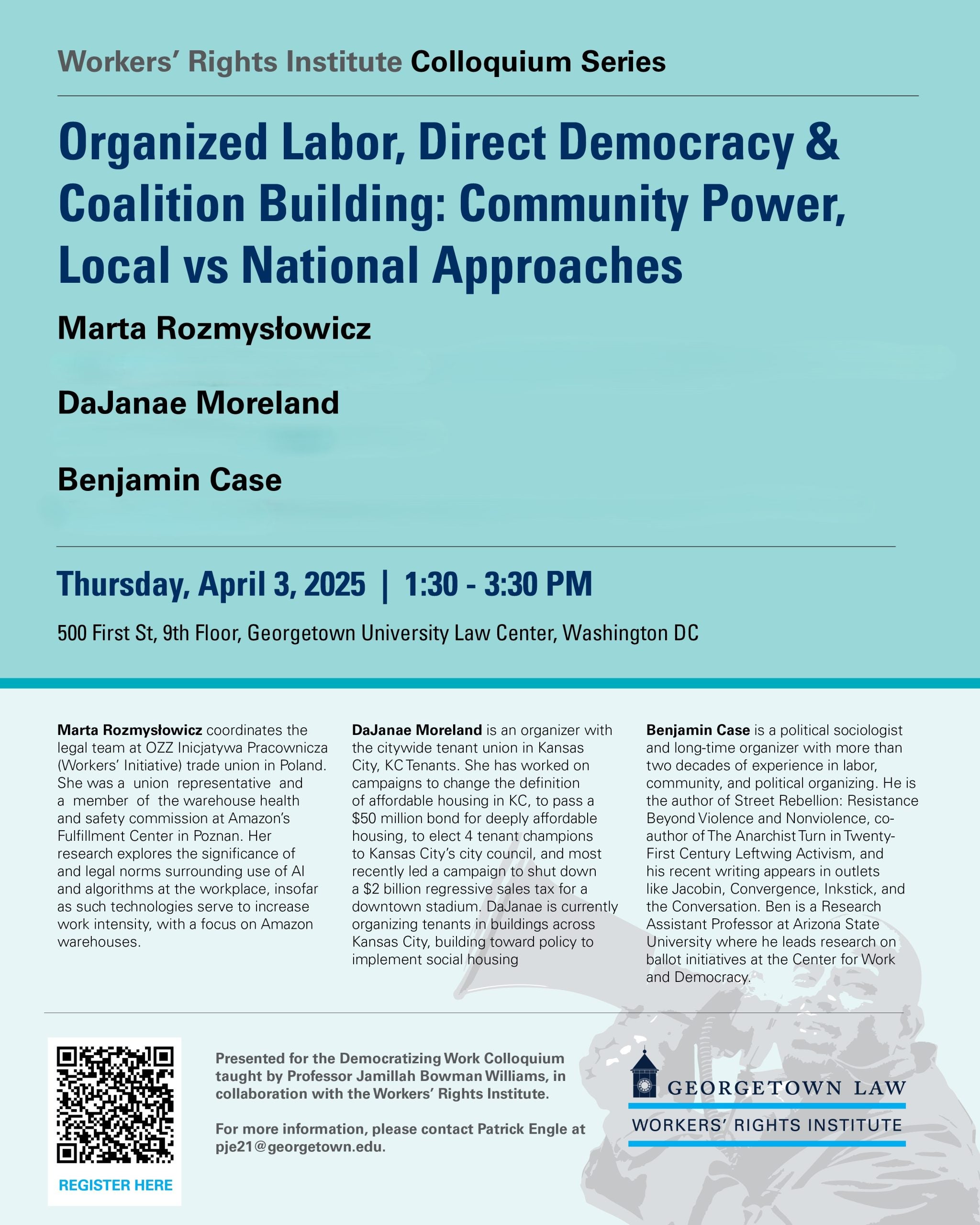
Topic: Organized Labor, Direct Democracy & Coalition Building: Community Power, Local vs National Approaches
Date: April 3, 2025
Guests:
Marta Rozmysłowicz, organizer and legal representative with OZZ Inicjatywa Pracownicza (Workers Initiative) in Poland, coordinates the legal team at OZZ Inicjatywa Pracownicza (Workers’ Initiative) trade union in Poland. She was a union representative and a member of the warehouse health and safety commission at Amazon’s Fulfillment Center in Poznań. Her research explores the significance of and legal norms surrounding use of AI and algorithms at the workplace, insofar as such technologies serve to increase work intensity, with a focus on Amazon warehouses.
DaJanae Moreland, KC Tenants Union, is an organizer with the citywide tenant union in Kansas City, KC Tenants. She has worked on campaigns to change the definition of affordable housing in KC, to pass a $50 million bond for deeply affordable housing, to elect 4 tenant champions to Kansas City’s city council, and most recently led a campaign to shut down a $2 billion regressive sales tax for a downtown stadium. DaJanae is currently organizing tenants in buildings across Kansas City, building toward policy to implement social housing.
Benjamin Case, Research Assistant Professor, Arizona State University’s Center for Work and Democracy, is a political sociologist and long-time organizer with more than two decades of experience in labor, community, and political organizing. He is the author of Street Rebellion: Resistance Beyond Violence and Nonviolence, co-author of The Anarchist Turn in Twenty-First Century Leftwing Activism, and his recent writing appears in outlets like Jacobin, Convergence, Inkstick, and the Conversation. Ben is a Research Assistant Professor at Arizona State University where he leads research on ballot initiatives at the Center for Work and Democracy.
Associated readings: The Case for the Tenant Union, Why Labor Unions Should Join the Housing Fight, A Direct Democracy Strategy for the Left, Automated Processing of Data on Work Performance and Employee Evaluation: A Case Study of Practices at Amazon Warehouses in Poland, ‘We’re Not Robots’: Legal Limits on Work Intensity at the AI-powered Warehouse
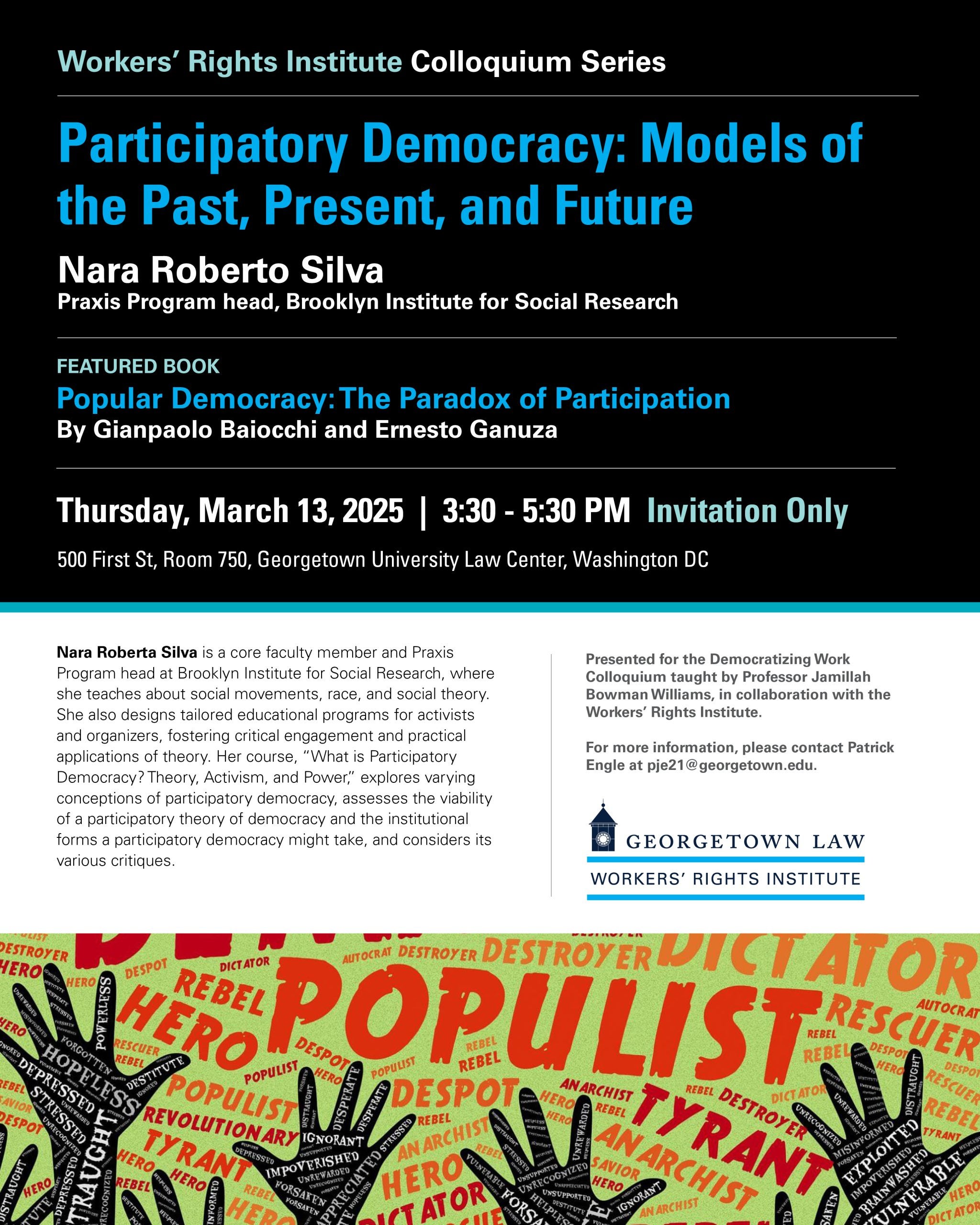
Date: March 13, 2025 | Invitation Only
Topic: Participatory Democracy: Models of the Past, Present, and Future
Guest: Nara Roberto Silva | Praxis Program head, Brooklyn Institute for Social Research
Featured Book: Popular Democracy: The Paradox of Participation by Gianpaolo Baiocchi and Ernesto Ganuza
Nara Roberta Silva is a core faculty member and Praxis Program head at Brooklyn Institute for Social Research, where she teaches about social movements, race, and social theory. She also designs tailored educational programs for activists and organizers, fostering critical engagement and practical applications of theory. Her course, “What is Participatory Democracy? Theory, Activism, and Power,” explores varying conceptions of participatory democracy, assesses the viability of a participatory theory of democracy and the institutional forms a participatory democracy might take, and considers its various critiques.
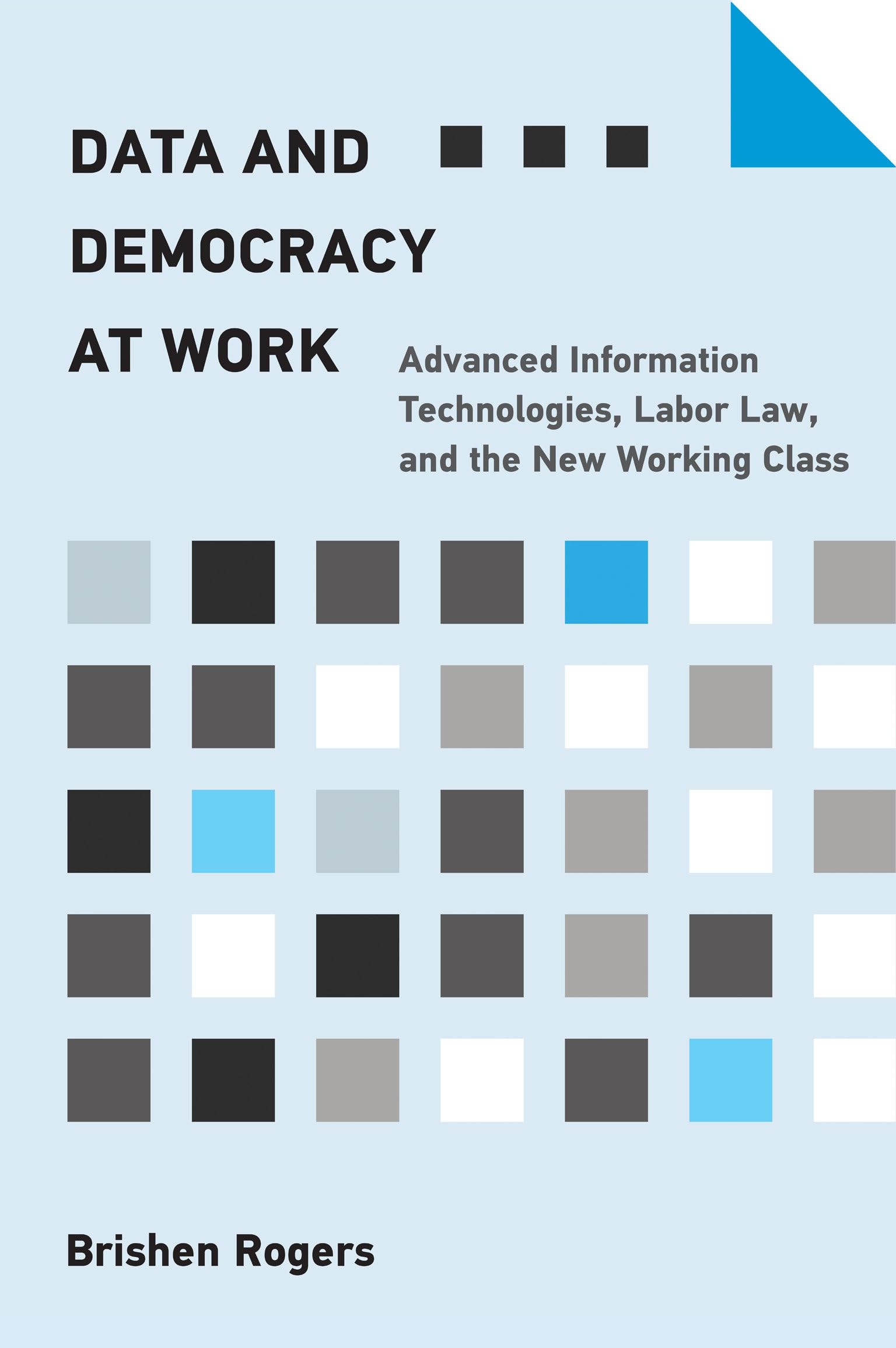
Date: February 6, 2025
Topic: How Work is Organized
Guest: Brishen Rogers | Professor of Law, Georgetown Law
Featured Book: Data & Democracy at Work Advanced Information Technologies, Labor Law, and the New Working Class
Professor of Law at Georgetown, Professor Rogers’ current research explores the relationship among labor and employment law, technological development, and economic and social equality. His book, Data and Democracy at Work, argues that companies often use new data-driven technologies as a power resource—or even a tool of class domination—and that our labor laws allow them to do so. His book describes the necessary legal reforms to increase workers’ associational power and democratize workplace data, establishing more balanced relationships between workers and employers and ensuring a brighter and more equitable future for us all.
Associated readings: Origin Stories: Plantations, Computers, and Industrial Control,Labor and Monopoly Capital: The Degradation of Work in the Twentieth Century
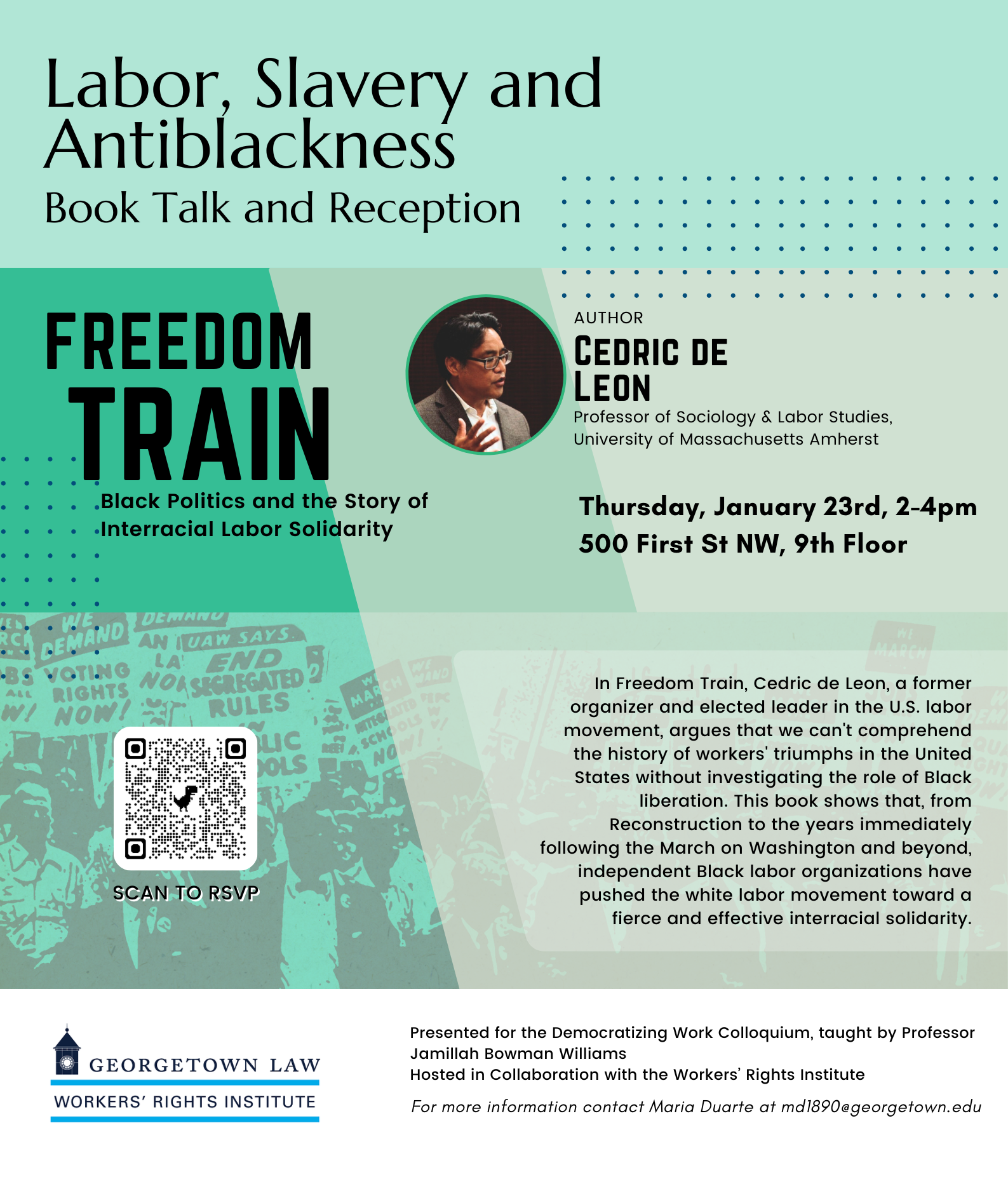
Date: January 23, 2025
Topic: Labor, Slavery and Antiblackness
Guest: Cedric de Leon | Professor of Sociology & Labor Studies, University of Massachusetts Amherst
Featured Book: Freedom Train: Black Politics and the Story of Interracial Labor Solidarity
In Freedom Train, Cedric de Leon, a former organizer and elected leader in the U.S. labor movement, argues that we can’t comprehend the history of workers’ triumphs in the United States without investigating the role of Black liberation. This book shows that, from Reconstruction to the years immediately following the March on Washington and beyond, independent Black labor organizations have pushed the white labor movement toward a fierce and effective interracial solidarity.
Associated reading: The Ruse of Recognition: Black Labor in the Afterlife of Slavery
